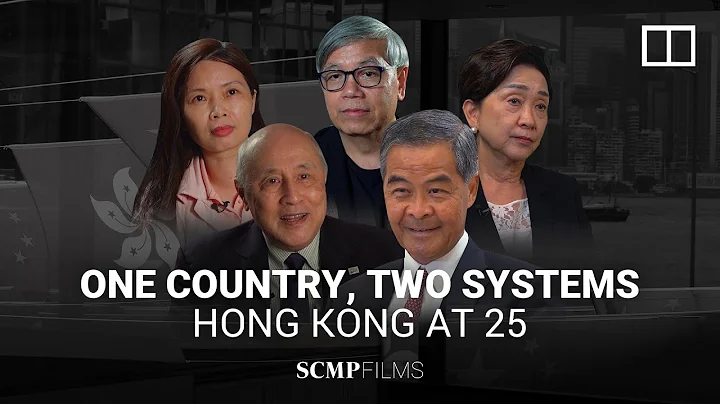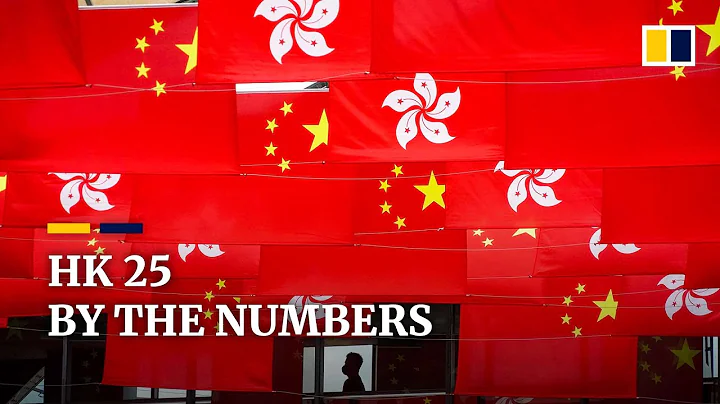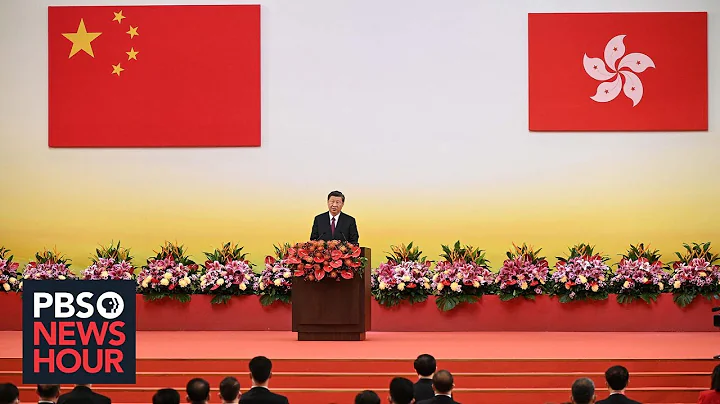has been working and living in Hong Kong for nearly 29 years. Yan Feng, a member of the National Committee of the Chinese People's Political Consultative Conference and chairman of the board of directors of Guotai Junan International, has become a witness and personal experience of Hong Kong's return to and its prosperity and development. What does Hong Kong look like in his eyes?
In 1978, the development of China's financial industry opened a new historical chapter. In 1990, the first stock exchange in New China, Shanghai Stock Exchange , officially opened; the following year, Shenzhen Stock Exchange officially opened.

△ From 1980 to 1985, Yan Feng (second from left) studied at Tsinghua University.
In 1980, Yan Feng, a native of Beijing, was admitted to Tsinghua University. After graduating from undergraduate degree and studying for graduate school, Yan Feng turned to economics with an environmental engineering major and diploma.
"At that time, I had a particularly strong premonition that the securities industry would become the focus and core of various industries after the reform and opening up, and Shenzhen Special Economic Zone would be at the forefront of China's reform and opening up." Under this understanding, After stepping out of the ivory tower, Yan Feng resolutely decided to go south to Shenzhen, joined Junan Securities, the most influential securities company in the mainland at that time, and began to engage in securities investment.
Perhaps there was an arrangement somewhere in the past, and Junan Securities would become the link between him and Hong Kong in the future.
After stepping out of that door,
what made him feel that Hong Kong was better than his hometown? In 1993, the investment banking business in the Mainland was in full swing. The ambitious Junan Securities set its sights on overseas markets and set up a branch in Hong Kong. Yan Feng also started Now I have stepped through that door and become one of the first batch of professionals working across the border between Shenzhen and Hong Kong.
"I have a big feeling: first, there is a language barrier. Hong Kong people at that time could not understand Mandarin ; second, there is a barrier between culture and living habits. Although Hong Kong is a small place, the people live a very delicate life. "We were new arrivals and didn't have much money. Our lives were both rough and tight. I remember that at that time, I almost ate at food stalls and tea restaurants. Unless local friends were treating me, I rarely had meat dishes." Because of the constant feeling of isolation. Around that time, Yan Feng felt that life and work in Hong Kong were quite tiring at that time.
This situation did not improve significantly until the return of Hong Kong in 1997.
After Junan merged with Cathay Pacific in 1999, it began to pay attention to resource integration and refined management. However, due to the rapid expansion of the company's institutions and an overly long investment front in the early stages of overseas development, overseas business operations were not managed well and there was even a risk of near insolvency.
At a critical moment, Yan Feng was ordered to take over Guotai Junan Hong Kong Company.
In fact, when it came to whether to accept the appointment, Yan Feng said that his biggest concern at the time was not whether he would get used to working and living in Hong Kong, but focused on Hong Kong’s unique positioning in the Asian and even global financial markets after returning to the motherland. - On the one hand, as an international financial center after its handover in 1997, Hong Kong will play an increasingly important role in connecting international capital to enter the mainland market, and Hong Kong's financial industry will also become larger and larger. This is a good opportunity to show off its talents. On the other hand, if you go to Hong Kong, you must face the test of international market supervision laws and regulations, and you need to meet the challenges of fierce market competition at any time.
In the end, Yan Feng firmly went to Hong Kong with optimism about the development prospects of Chinese securities companies in Hong Kong and an unsatisfied belief. After taking over the Hong Kong company, he decisively liquidated and integrated more than 100 overseas companies of the former Cathay Securities and the former Junan Securities, and established Cathay Junan Financial Holdings Co., Ltd.
In July 2010, with the approval of China Securities Regulatory Commission , Hong Kong Securities Regulatory Commission and the Hong Kong Stock Exchange, Guotai Junan International Holdings was listed on the Hong Kong Stock Exchange, with a financing amount of more than 1.7 billion Hong Kong dollars, becoming the first company listed in Hong Kong. Chinese securities firms. In March 2011, the company's stocks were successfully selected into the Hang Seng Composite Index Financial component , creating a precedent for a Chinese securities company. Guotai Junan International has gradually grown from a securities company with a total investment of only HK$31.98 million and operations that have almost come to a standstill for many years to a leading Chinese securities company with annual profits exceeding HK$1 billion and a market value exceeding HK$15 billion.

△In 2012, Yan Feng, then president of the Hong Kong Chinese Securities Association, delivered a speech at the association’s fifth anniversary dinner.
In 2007, Yan Feng and his colleagues founded the Hong Kong Chinese Securities Industry Association on the basis of the Securities Industry Committee of the Hong Kong Chinese Enterprises Association. Since 2015, Yan Feng has served as the permanent honorary president. In addition, he was elected as a member of the Election Committee of the Hong Kong Special Administrative Region in the three Hong Kong chief executive elections in 2012, 2017 and 2022.
"I have been working and living in Hong Kong for nearly 29 years. Intentionally or unintentionally, I have become a witness and experiencer of Hong Kong's return, prosperity and development. This unique experience has become an inseparable part of my life. Hong Kong to me "It's better than my hometown. I have an indescribable complex feeling for this land that has given me nourishment and motivation." Without deep affection, it would be difficult for Yan Feng, an economist who is accustomed to rational thinking, to say this.
Originally unfamiliar domestic and overseas markets,
"the door has been torn down" as you come and go.
"We are pleased to see that in the 25 years since the return of Hong Kong and the Mainland, Hong Kong and the Mainland have made great progress in politics, economy, society, trade, technology, sports, and culture. The integration of the Mainland and Hong Kong on the Establishment of Closer Economic and Trade Partnership (CEPA) is undoubtedly the economic relationship between Hong Kong and the Mainland. An important symbol of integration.
In terms of goods trade, zero tariffs have been implemented for imported products originating in Hong Kong. In terms of trade in services, there are currently more than 2,000 Hong Kong companies applying to invest in the mainland in accordance with the preferential conditions of CEPA. In terms of direct investment, as of the end of 2020, the cumulative actual investment by Hong Kong businessmen in the mainland was US$1,301.3 billion, accounting for 53.3% of the total cumulative foreign investment introduced by the mainland; the stock of direct investment from the mainland in Hong Kong reached US$1,438.5 billion, accounting for outbound direct investment 56%.
"In the 25 years since its return, the country and the Hong Kong Special Administrative Region have encouraged mainland companies to list and raise funds in Hong Kong. As of the end of 2021, there were 1,368 mainland companies listed in Hong Kong, with a total market value of approximately US$4.3 trillion, accounting for 79% of the total market value. At present, more than 50% of the listed companies on the Hong Kong Stock Exchange are listed companies with a mainland background. The total market value of mainland companies listed in Hong Kong accounts for about 80% of the overall market value of Hong Kong stocks and , and the transaction volume accounts for nearly 90%. "Talk about these data. , Yan Feng has numerous treasures from his family.
According to the latest ranking of the International Financial Center Index recently announced, Hong Kong ranks third in the world and first in Asia. According to data from the Hong Kong Stock Exchange, the total market value of the Hong Kong stock market at the end of 1996 was HK$3.2 trillion. At the end of 2021, the total market value of the Hong Kong stock market was HK$40.1 trillion, an increase of 1153.1%.
The two places have actively promoted the two-way opening of the capital market, and have successively launched Qualified Foreign Institutional Investor (QFII), Qualified Domestic Institutional Investor (QDII), RMB Qualified Foreign Institutional Investor (RQFII), and RMB Qualified Domestic Institutional Investor (RQFII). Capital market opening measures such as institutional investors (RQDII), qualified domestic limited partners (QDLP), qualified domestic investment enterprises (QDIE), Shanghai-Hong Kong Stock Connect , Shenzhen-Hong Kong Stock Connect, Bond Connect, mutual recognition of funds, etc., under the capital account The scale of cross-border investment and financing continues to expand. In October 2021, Guangdong-Hong Kong-Macao Greater Bay Area " Cross-border Financial Management Link " was officially launched, allowing residents including Hong Kong, Macau and nine cities in Guangdong Province to invest cross-border in financial products sold by banks in the Guangdong-Hong Kong-Macao Greater Bay Area. .
"Hong Kong is also the global offshore RMB business hub." According to Yan Feng, the country and the Hong Kong Special Administrative Region fully support and help Hong Kong develop personal RMB business, issue RMB bonds , carry out cross-border RMB settlement pilots, wealth management links, etc. , making Hong Kong an important platform for international investors to allocate RMB assets and the world's most important offshore RMB market. According to Society for Worldwide Interbank Financial Telecommunications (SWIFT), in 2021, Hong Kong was the world's largest offshore RMB settlement center , accounting for approximately 76% of global RMB payment transactions.
Cherish the strong support given by the "backing",
serve as a bridge and gateway for China to the world
"As a witness of Hong Kong's 25-year return to the motherland, I have witnessed the test of ' one country, two systems ' and its rich development and increasingly strong Improvement directly reflects the country's tremendous support to Hong Kong in terms of policies, funds, talents, etc. over the past 25 years, which has enabled Hong Kong to safely survive major financial crises such as the 1997 Asian Financial Crisis and the 2008 Global Financial Crisis, and properly respond to the 2003 SARS epidemic. , the COVID-19 epidemic and other major public health incidents since 2020, we have successfully overcome major governance difficulties and challenges such as the illegal Occupy Central incident in 2014, handling the storm over the amendment bill in 2019, promoting the implementation of the Hong Kong National Security Law in 2020, and completing the electoral system reform in 2021. , ensuring national security, political stability, economic development, financial vitality, efficient rule of law, democracy and freedom, and people's livelihood and tranquility." In terms of social development, Yan Feng shared some of his experiences.
First, "one country, two systems" has given Hong Kong great vitality.
In the 25 years since its return, "one country, two systems" has given Hong Kong huge dividends. With the support of various national policies, Hong Kong and the mainland have further integrated in many fields such as economy, society, and people's livelihood. Hong Kong serves as the junction of internal and external economic circulation, and is the hub for the flow of domestic and overseas capital, commodities, talents, information, and technology. It is an important bridge, a gateway for cross-border exchanges, a bridgehead for domestic enterprises and funds to go global, and a springboard for overseas enterprises and funds to enter the Chinese market. Its status is becoming increasingly important, and its competitiveness is constantly improving.
"After the storm, there is a rainbow. Today's Hong Kong has given a more comprehensive and accurate interpretation of 'Hong Kong people governing Hong Kong' based on the principle of patriots governing Hong Kong, ensuring the stability and long-term development of 'one country, two systems' and giving Hong Kong strong vitality." Yan Feng Put it this way.
Second, the national backing gives Hong Kong strong economic resilience.
In the 25 years since its return, Hong Kong has experienced multiple impacts and challenges. It is the country's strong backing and comprehensive support that has enabled Hong Kong's economy to show strong resilience and complete the transformation from a shipping and trade-led economy to a high-value service-led industry layout such as trade, finance, law, accounting, consulting, and technology. Transformation and upgrading have further consolidated and enhanced its status as an international financial, trade and shipping center.
Figures from the Census and Statistics Department of the Hong Kong SAR show that Hong Kong’s GDP in 1997 was HK$1.37 trillion, and Hong Kong’s nominal GDP in 2021 was HK$2.86 trillion; the per capita GDP increased from HK$192,000 before the handover to HK$2021. It doubled from HK$387,100 in 2017.
Third, the role of cross-border gateway enhances the status of an international financial center. In the 25 years since the return of
, the country's preferential policies for Hong Kong have given it a special role as a cross-border gateway, effectively consolidating and enhancing Hong Kong's status as an international financial center.
After the handover, the financial interconnection between Hong Kong and the mainland has become closer. With the country's steady economic growth and comprehensive opening up to the outside world, the demand for RMB in trade, investment and savings continues to increase. The international status of RMB is increasing day by day, and Hong Kong, as an independent With its role as an offshore RMB business hub, its status as an international financial center has become more consolidated.
Fourth, improve people's livelihood and make people live and work in peace and contentment.
Hong Kong’s social construction achievements in the past 25 years since its return are more convincing by sorting out people’s livelihood projects.
The first thing is to have a place to live. In Hong Kong, where housing prices are the highest in the world and land is at a premium, more than half of the permanent population enjoys preferential government policies and live in public rental housing and subsidized home ownership housing built under the leadership of the government.
The second is to have a pension when you are old. After the handover, the SAR government legislated minimum hourly wages and monthly wages to protect low-income workers from being exploited by unscrupulous employers; it also implemented a mandatory provident fund system with contributions from both employers and employees. Currently, the MPF system has covered 77% of citizens.
The third thing is to get medical treatment. The principle of public hospitals is to give priority to serving citizens in urgent need, mainly treating serious illnesses, serious illnesses, and emergency illnesses. Public medical expenses are mainly funded by the government, 95% of which come from taxes, and the remaining 5% come from individual service charges.
The fourth is to achieve success.Since its return to the motherland, Hong Kong has made great achievements in infrastructure construction. The world-famous Hong Kong-Zhuhai-Macao Bridge and the Guangzhou-Shenzhen-Hong Kong Express Rail Link have been completed, which has shortened the distance between Hong Kong and the mainland and broadened the living space of Hong Kong residents. In Hong Kong today, the MTR is well connected in all directions, and buses, trams, taxis, and ferries provide citizens with extremely convenient travel options.
"History and reality tell us that the inherent needs and rapid development of China's economy will always be the biggest dividend for Hong Kong's development." Yan Feng firmly believes that as long as we firmly adhere to, develop, cherish and embrace "one country, two systems", Hong Kong will definitely have a A more stable, prosperous and better future.





















